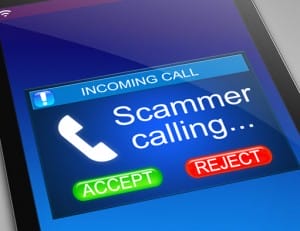Beware Phantom Hackers
Beware Phantom Hackers: a reader asks…
I’ve been reading online about how scammers and hackers are cheating senior citizens out of billions of dollars. I read your advice and try to stay safe, but I’m worried that these criminals are so good that they can defeat any measures I take. What should I do, or not do, to keep my computer and my money safe?
You have a good start by reading my articles here, as I’ve been talking about this non-stop for years. Of course, you know not to trust phone calls, email and text messages (even those that look like they come from someone you know, your bank or other company). The FBI recently issued a (not-so-new) new warning about “the Phantom Hacker” where an imposter pretends to be a customer service representative from tech support, your financial institution, or from the government. Often these start with a phone call, but there are also email and text scams running. I recommend you read that article.
I also recommend you take additional steps to protect yourself, e.g., your digital life. I have an article at https://positek.net/protect-your-digital-life/ that goes into detail about various things you should be doing, and not doing. Worth a read in my opinion. This includes having a credit monitoring service and keeping a credit freeze on you so nobody can open accounts in your name, even if they do have your personal info (they do).

My simple solution to stop phone scams is to use caller ID on my phones and not to answer calls from numbers I don’t know (unless I’m expecting a call). I also use blocking services – the FCC has an article about that at https://www.fcc.gov/call-blocking, and if I do answer a call and don’t know the person on the other end, I don’t carry on a conversation, I simply say “take me off your list and don’t call me again” then hang up.
I never respond to unsolicited emails or text messages, even if they look like something legitimate. If I’m interested, I’ll independently find out about them, using a search engine, snopes.com and others. Lately I’ve been getting a lot of emails from Paypal, Venmo and other online entities (financial and non-financial) saying I owe them money and to call to dispute the charges. I never engage, at the most I’ll forward the emails to phishing@paypal.com, phishing@venmo.com etc.

And it should go without saying (but often doesn’t) that you need to keep your computing devices up-to-date. See my previous article about the end of Windows 10 – if you’ve an older computer it’s time to replace it. Even if you’ve a modern computer, it still needs updates and not just the operating system – every app and program you’ve installed on it needs to be kept up-to-date. We often like to keep and use our devices (like smartphones and tablets) for way beyond their expected and supported service life. You need to budget accordingly to only use such devices that are still being supported and updated by the manufacturer.

The bad guys out there are highly creative and highly motivated. After all, they’ve been enjoying lucrative profits from their many scams and hacks for years. At the risk of sounding trite, constant vigilance is required here. You need to stay on top of the news so that when these criminals come up with a new scam, you know about it and can watch out for it. This of course takes a lot of work, which is why there are some trusted sources (like snopes.com) and (I hope you agree) PosiTek.net.
Lastly, I recommend the defer & delay rule. Anytime you’re pressured to do something right away, don’t. Take as much time as you need to research and determine if something is legitimate or not. Particularly when it comes to anything having to do with your money, or your computer or devices. Be a bit paranoid, and trust only people you know (in the real world) who’ve proven to know what they’re advising.
Not to belabor a previous point, but just because an email has their name in the From line doesn’t mean it really comes from them. Hackers are constantly spoofing and hacking into people’s email accounts. If anything about an email or text from someone you know seems a little off, contact them directly in another way to verify if they really sent you that message. And, don’t click any links in email without verifying that they are 100% legit. Any link in an email or text should be suspect. Be more than a bit paranoid, prudent in today’s threat environment.
This website runs on a patronage model. If you find my answers of value, please consider supporting me by sending any dollar amount via:
or by mailing a check/cash to PosiTek.net LLC 1934 Old Gallows Road, Suite 350, Tysons Corner VA 22182. I am not a non-profit, but your support helps me to continue delivering advice and consumer technology support to the public. Thanks!







